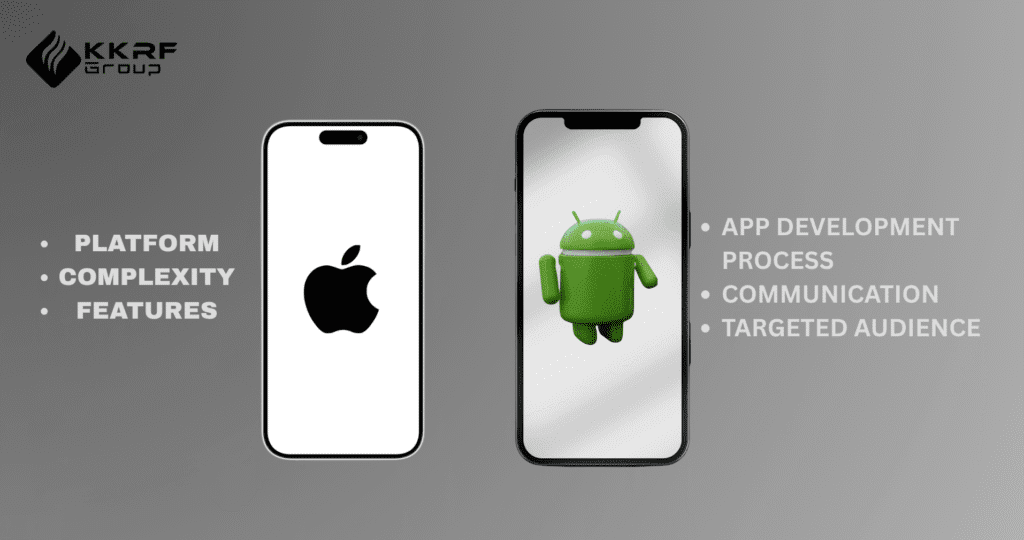What Is the Average Time Needed to Develop a Mobile App in 2025?
The moment you generate an app concept, your mind is inundated with a multitude of inquiries. Following “How much will it cost?” one of the most often asked questions is: “What is the average time needed to develop a mobile app??” This is a shared worry particularly given the increasing competitiveness and daily flood of fresh apps onto the scene. Many of our clients find it difficult to grasp this, hence we are here to clarify how you could project the time needed to create a mobile app.
First of all, the first release date of an app is very hard to forecast exactly. Many unpredictable elements can affect the development process even if you obviously know the goal and target audience of your app. Consequently, the time needed by Indian or somewhere else mobile app developers can differ greatly.
Key Factors Influencing the Time Needed for Mobile App Development

The platform selected typically determines the majority of the time and effort required to create a fully functional app. Our experience tells us that both Android and iOS demand a lot of time; but, Android usually takes more. This is mostly related to the fragmentation of devices; Android apps have to be created to support more range of screen sizes, OS versions, and pixel densities.
Despite the fact that Google has made strides in enhancing and simplifying the Android Software Developers Kit (SDK), there is still room for improvement in order to align with the iOS platform’s consistency. Furthermore, Android still has more difficulties in development even if its app approval procedure is shorter than that of iOS.
Our knowledgeable group of iOS and Android app developers is familiar with the typical difficulties and the finest approaches to go beyond them.
Complexity
Whether in the UK, US, or abroad, the time needed for app creation mostly relies on how well mobile app developers—that is, comprehend your idea. If the concept is simple—that of a basic wallpaper app or a copy of an already-existing software—developers will find it simpler and faster to grasp and apply.
More work is required to precisely define and explain the idea, though, if the app calls for fresh and unusual elements. This is really important since greater results follow from a better knowledge.
Before starting development, at KKRF Group we give great importance to fully analyzing and investigating the range of your mobile app idea.
Features
The whole development period of your mobile application is much influenced by the features you decide to incorporate. The process gets more time-consuming the more features one possesses.
Additionally, the kind of features or capabilities counts; some are easy to use, while others—especially if they are complicated—may need more time and effort.
The time and resources required for successful implementation are directly impacted by each feature’s complexity.
The intricacy of your app’s concept and features may present risks, particularly if you make significant investments and don’t see the expected returns. We advise beginning with an MVP (Minimum Viable Product) to prevent wasting time, money, and effort.
Only the features required to test your idea in the marketplace and get insightful input for future improvements are included in an MVP. The feedback can help you improve your idea if the first version doesn’t work out. Future updates may add more features if it proves successful.
Even though it takes a lot of time, this method is a strategic and economical way to lower risk and enhance results.
Targeted Audience

It takes less resources to develop a mobile app for 1,000 users at once than it does to create one for 50,000 users. More money must be spent on architecture, infrastructure, performance testing, and optimization in order to serve a larger user base. The total development time naturally rises as a result of these extra efforts.
We think it’s more valuable to release a stable, fully functional, and bug-free app than to swiftly release a flawed one. For this reason, we give careful testing top priority and make sure the app satisfies all crucial KPIs prior to launch.
App Development Process
The time required to create an app is greatly influenced by the development process you use. From planning to design, development, and testing, a well-organized process guarantees seamless progress while maintaining timeliness. On the other hand, a subpar procedure can cause the workflow to collapse.
The Agile methodology, which we use at KKRF Group, encourages cooperation between the client and the development team. Iterative development, early delivery, adaptive planning, and continuous improvement are all encouraged by this methodology. It works particularly well for intricate projects with constantly shifting specifications.
Furthermore, we create various app modules concurrently as opposed to sequentially. This approach expedites delivery and makes it possible to accomplish project objectives more quickly.
Communication
Successful results depend on the client and the Mobile app development company
having effective communication. Ongoing communication makes it possible to guarantee that any problems or gaps are quickly fixed. Communication breakdowns caused by time zone differences or other barriers make it more difficult to resolve development issues, which ultimately delays the completion of the app.
In order to ensure quicker development and more seamless collaboration, our team is dedicated to upholding clear and consistent communication throughout the project.
Wrapping Up
The aforementioned points make it clear that creating a top-notch mobile application is not an easy or quick process. To create an app that really stands out in a crowded market, a lot of time, energy, strategic planning, and money are needed. We are available to assist you if you need advice or have any questions about the process of developing an app.
